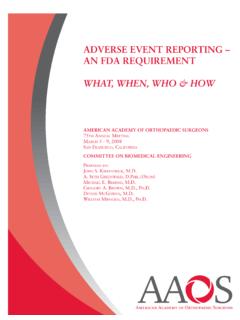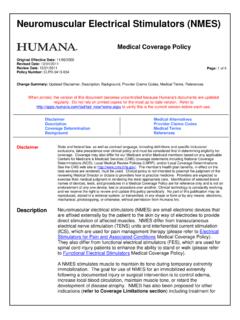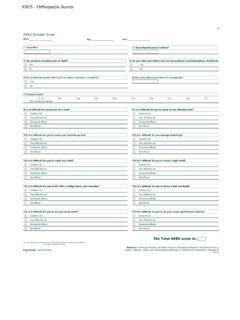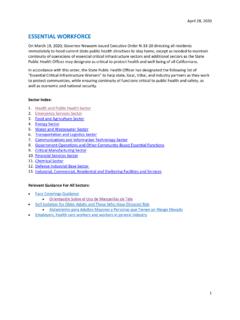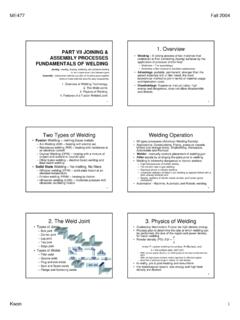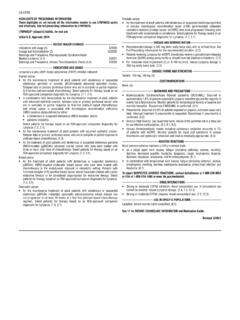Transcription of Management of Rotator Cuff Injuries
1 Management of Rotator Cuff Injuries Evidence-Based Clinical Practice Guideline Adapted by: The American Academy of Orthopaedic Surgeons Board of Directors March 11, 2019. Endorsed by: Please cite this guideline as: American Academy of Orthopaedic Surgeons. Treatment of Pediatric Diaphyseal Femur Fractures Evidence-Based Clinical Practice Guideline. Published March 23, 2020. View background material via the RC CPG eAppendix 1. View data summaries via the RC CPG eAppendix 2. Disclaimer This Clinical Practice Guideline was developed by an AAOS physician volunteer Clinical Practice Guideline development group based on a systematic review of the current scientific and clinical information and accepted approaches to Management of Rotator cuff Injuries .
2 This clinical practice guideline is not intended to be a fixed protocol, as some patients may require more or less treatment or different means of diagnosis. Clinical patients may not necessarily be the same as those found in a clinical trial. Patient care and treatment should always be based on a clinician's independent medical judgment, given the individual patient's clinical circumstances. Disclosure Requirement In accordance with AAOS policy, all individuals whose names appear as authors or contributors to the clinical practice guideline filed a disclosure statement as part of the submission process.
3 All panel members provided full disclosure of potential conflicts of interest prior to voting on the recommendations contained within this clinical practice guideline. Funding Source This clinical practice guideline was funded exclusively by the American Academy of Orthopaedic Surgeons who received no funding from outside commercial sources to support the development of this document. FDA Clearance Some drugs or medical devices referenced or described in this clinical practice guideline may not have been cleared by the Food and Drug Administration (FDA) or may have been cleared for a specific use only.
4 The FDA has stated that it is the responsibility of the physician to determine the FDA clearance status of each drug or device he or she wishes to use in clinical practice. Copyright All rights reserved. No part of this clinical practice guideline may be reproduced, stored in a retrieval system, or transmitted, in any form, or by any means, electronic, mechanical, photocopying, recording, or otherwise, without prior written permission from the AAOS. If you wish to request permission please contact the AAOS Department of Clinical Quality and Value at Published 2019 by the American Academy of Orthopaedic Surgeons 9400 Higgins Road Rosemont, IL 60018.
5 First Edition Copyright 2019 by the American Academy of Orthopaedic Surgeons View background material via the RC CPG eAppendix 1. View data summaries via the RC CPG eAppendix 2 2. To View All AAOS Evidence-Based Clinical Practice Guidelines and Appropriate Use Criteria in a User-Friendly Format, Please Visit the OrthoGuidelines Website at or by downloading the free app to your smartphone or tablet via the Apple and Google Play stores! View background material via the RC CPG eAppendix 1. View data summaries via the RC CPG eAppendix 2 3. Table of Contents Summary of recommendations.
6 7. Management of Small to Medium Tears .. 7. Long Term Non-Operative 7. Operative Management .. 7. Acromioplasty & Rotator Cuff repair .. 7. Distal Clavicle Resection .. 8. Diagnosis (Clinical Examination) .. 8. Diagnosis (Imaging).. 8. Post-op Mobilization Timing .. 8. Corticosteroid Injections for Rotator Cuff Tears .. 9. hyaluronic Acid Injections for Rotator Cuff Tears .. 9. Platelet Rich Plasma (PRP) Injection in Partial-Thickness Tears .. 9. High-grade Partial Thickness Rotator Cuff Tears .. 9. Prognostic Factors (Age) .. 10. Prognostic Factors (Higher BMI).
7 10. Prognostic Factors (Worker's Compensation) .. 10. Prognostic Factors (Comorbidites) .. 10. Prognostic Factors (Diabetes) .. 11. Prognostic Factors (Patient Expectations) .. 11. Biological Augmentation with Platelet Derived Products .. 11. Single-row vs Double-row repair .. 11. Single-row vs Double-row repair Re-tears .. 12. Marrow Stimulation .. 12. Dermal Allografts .. 13. Xenografts .. 13. Open vs Arthroscopic repair .. 13. Postoperative Pain Management .. 13. Summary of Consensus Statements .. 14. Supervised Exercise vs Unsupervised Exercise .. 14. Multiple Steroid Injections for Rotator Cuff 14.
8 Platelet Rich Plasma (PRP) Injection in Full-Thickness Tears .. 14. Partial Rotator Cuff Tear .. 14. Unrepairable Tears without Arthropathy (Biologic Procedures) .. 15. Massive, Unrepairable Rotator Cuff Tear (Reverse Arthroplasty) .. 15. Unrepairable Tears with Arthropathy .. 15. Development Group Roster .. 16. Non-Voting Members .. 17. Introduction .. 18. Overview .. 18. Goals and Rationale .. 18. Intended Users .. 18. Patient Population .. 19. Burden of Disease .. 19. View background material via the RC CPG eAppendix 1. View data summaries via the RC CPG eAppendix 2 4.
9 Etiology .. 19. Incidence and Prevalence .. 19. Risk Factors .. 19. Potential Benefits, Harms, and Contraindications .. 20. Future Research .. 20. 21. Best Evidence Synthesis .. 21. Literature 21. Defining the Strength of the Recommendations .. 21. Voting on the Recommendations .. 21. Interpreting the Strength of Evidence .. 22. Peer Review .. 23. Public Commentary .. 23. The AAOS Clinical Practice Guideline Approval Process .. 23. Revision 23. Systematic literature review Dissemination Plans .. 23. Study Attrition Flowchart .. 24. Recommendations .. 25. Management of Small to Medium Tears.
10 25. Long Term Non-Operative 26. Operative Management .. 27. Acromioplasty& Rotator Cuff repair .. 28. Distal Clavicle Resection .. 29. Diagnosis (Clinical Examination) .. 30. Diagnosis (Imaging).. 34. Post-op Mobilization Timing .. 36. Corticosteroid Injections for Rotator Cuff Tears .. 38. hyaluronic Acid Injections for Rotator Cuff Tears .. 39. Platelet Rich Plasma (PRP) Injection in Partial-Thickness Tears .. 40. High-grade Partial Thickness Rotator Cuff Tears .. 41. Prognostic factors (age) .. 42. Prognostic factors (higher bmi) .. 43. Prognostic factors (Worker's Compensation).



